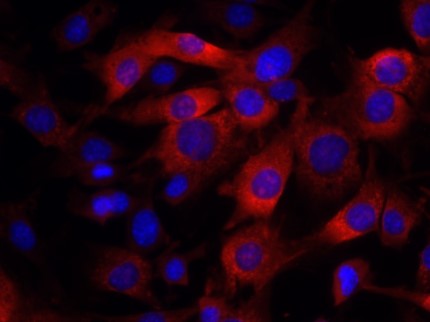How diet and exercise affect our cells

Reactive oxygen species (red) produced by muscle cells
Posted: Thu, 3 Nov 2016
Two major diseases affecting New Zealanders, obesity and type 2 diabetes, are known to respond positively to exercise and a calorie-restricted diet. The positive benefits of these interventions are a reduction in the incidence of the disease and extended lifespan.
A new Marsden-funded Fast-Start project, led by Dr Troy Merry of Molecular Medicine and Pathology at the University of Auckland, will investigate how diet and exercise affect mitochondria, the energy generating machinery in our cells.
Dr Merry and colleagues from the University of Otago and ETH Zurich in Switzerland will focus on recently identified mitochondrial-derived peptides such as humanin, which have been linked with protective effects in age-related neurological damage. They will focus also on how these molecules may protect us from metabolic stress and oxidative stress.
Dr Merry and his team are interested in the effects of short-term (acute) and long-term (chronic) changes of diet or exercise on peptide levels in blood and muscle tissue. Specifically, they will investigate how these interventions, and the resultant changes in peptide levels, contribute to restoring metabolic balance, focussing on obesity.
They theorise that acute increases in metabolic activity (e.g. short bursts of exercise, change in diet) raise peptide levels to protect against metabolic stress and oxidative stress. In contrast, chronic metabolic stress (e.g. obesity) may result in a drop in peptide levels and a loss of protection.
This project will pioneer an exciting new field of metabolic research and provide a better understanding of the biological processes underlying diseases like diabetes and obesity.

Dr Troy Merry
Total Funding: $300,000 (excl. GST) for 3 years
Researchers: Dr Troy Merry, Molecular Medicine and Pathology, The University of Auckland, 85 Park Rd, Grafton, Auckland 1023
